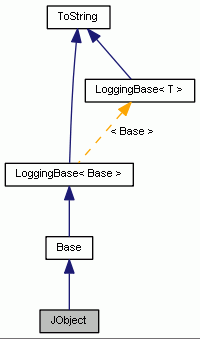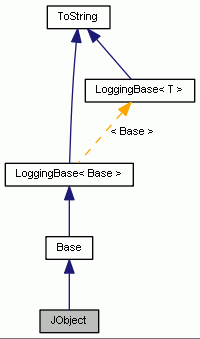 Photon C++ Client API
5.0.7.3
Photon C++ Client API
5.0.7.3
|
 Photon C++ Client API
5.0.7.3
Photon C++ Client API
5.0.7.3
|


Public Member Functions | |
| template<typename FT > | |
| JObject (const FT &payload) | |
| template<typename FT > | |
| JObject (FT *payloadArray, unsigned int elementCount) | |
| JObject (const JObject &toCopy) | |
| JObject & | operator= (const JObject &toCopy) |
| bool | operator== (const JObject &toCompare) const |
| bool | operator!= (const JObject &toCompare) const |
| template<typename FT > | |
| const FT & | getPayload (void) const |
| template<typename FT > | |
| FT & | getPayload (void) |
| unsigned int | getElementCount (void) const |
| virtual JString & | toString (JString &retStr, bool withTypes=false) const |
| virtual JString & | toString (JString &retStr, bool withTypes=false) const=0 |
| JString | toString (bool withTypes=false) const |
 Public Member Functions inherited from Base Public Member Functions inherited from Base | |
| virtual | ~Base (void)=0 |
 Public Member Functions inherited from LoggingBase< Base > Public Member Functions inherited from LoggingBase< Base > | |
| virtual | ~LoggingBase (void)=0 |
 Public Member Functions inherited from ToString Public Member Functions inherited from ToString | |
| virtual | ~ToString (void) |
| virtual JString | typeToString (void) const |
| JString | toString (bool withTypes=false) const |
Additional Inherited Members | |
 Static Public Member Functions inherited from LoggingBase< Base > Static Public Member Functions inherited from LoggingBase< Base > | |
| static void | setListener (const BaseListener *pBaseListener) |
| static int | getDebugOutputLevel (void) |
| static bool | setDebugOutputLevel (int debugLevel) |
| static const LogFormatOptions & | getLogFormatOptions (void) |
| static void | setLogFormatOptions (const LogFormatOptions &options) |
| bool operator== | ( | const JObject & | toCompare | ) | const |
operator==.
Two instances are considered equal, if the results of calling typeid() on their payloads as well as their payloads themselves are equal.
| bool operator!= | ( | const JObject & | toCompare | ) | const |
operator!=.
| retStr | reference to a string, to store the return-value in; the information, which is generated by this function, will be attached at the end of any eventually existing previous content of the string |
| withTypes | set to true, to include type information in the generated string |
Implements ToString.
| toString |
| retStr | reference to a string, to store the return-value in; the information, which is generated by this function, will be attached at the end of any eventually existing previous content of the string |
| withTypes | set to true, to include type information in the generated string |
| JString toString |
This is an overloaded member function, provided for convenience. It differs from the above function only in what argument(s) it accepts.
| withTypes | set to true, to include type information in the generated string |